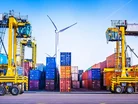The Scope 3 Year in Stories: October 2024

DP World Partners with Emitwise & Sedex on Scope 3 Emissions
DP World, a global logistics and supply chain solutions powerhouse, has set sights on a new sustainability frontier. It recently announced strategic partnerships with Emitwise and Sedex to tackle one of the most pressing challenges in corporate sustainability: Scope 3 emissions.
The partnership signals a transformative step towards reducing the carbon footprint and enhancing the sustainability of supply chains worldwide.
Scope 3 emissions are indirect emissions that occur throughout a company's value chain, typically representing its largest carbon footprint share.
Unlike Scope 1 and Scope 2 emissions, which the company directly controls, Scope 3 emissions originate from various sources, including suppliers and logistics operations.
Addressing these emissions requires a comprehensive and collaborative approach, precisely what DP World aims to achieve through its partnerships with Emitwise and Sedex.
Central to this effort is Emitwise, a company specialising in providing sustainability professionals with precise data to make informed decisions about reducing emissions.
Its role in the partnership is crucial, as it enables DP World's procurement and sustainability teams to manage Scope 3 decarbonisation efforts with the support of accurate, primary emissions data.
Emitwise's technology allows suppliers of varying sustainability maturity levels to take concrete steps towards reducing their carbon emissions, ultimately leading to a more sustainable supply chain across DP World's global operations.
While Emitwise focuses on the quantitative side of emissions data, Sedex brings a complementary insight into the equation. Sedex's platform identifies, assesses and prioritises social and environmental risks within the supply chain by design.
The holistic approach acknowledges that managing Scope 3 emissions is not solely about carbon reductions; it's about understanding the broader impacts on the environment and society.
How Lidl is Targeting Scope 3 in Push for Net Zero by 2050
Lidl, one of Europe’s largest food retailers, has committed to achieving net-zero emissions by 2050.
The retailer has set ambitious climate goals covering its global operations and supply chain. As part of this, the company is targeting Scope 3 emissions, which account for the vast majority of its overall climate footprint, to help meet broader sustainability goals.
Lidl also aims to cut its Scope 1 and 2 emissions by 70% by 2030, based on a 2019 baseline. So far, the company has already reduced these emissions by 52%.
In Great Britain, Lidl sources 100% of its electricity from renewable energy and is implementing various sustainability projects, but the discount supermarket's long-term strategy doesn’t stop at direct emissions.
Scope 3 emissions cover everything from the value chain to products sold in stores.
These emissions are indirect, generated from the production and processing of goods sold by Lidl, including meat and dairy products, which contribute heavily to the company’s carbon footprint.
Lidl’s target is to reduce emissions from agriculture, forestry and land use by 42.4% in the next 10 years, while emissions from energy and industry sectors are set to be reduced by 35% within the same timeframe.
The company is working closely with suppliers to achieve these targets. Partnerships with platforms like Manufacture 2030 and Mondra are helping Lidl gather accurate Scope 3 data and focus on reducing emissions across its supply chain.
Make sure you check out the latest industry news and insights at Scope 3 Magazine and be part of the conversation at our global conference series, Sustainability LIVE and Procurement & Supply Chain LIVE.
Discover all our upcoming events and secure your tickets today. Subscribe to the Scope 3 Magazine newsletter.
Scope 3 Magazine is a BizClik brand.
- The Evolving Role of Chief Sustainability OfficersScope 1 2 and 3
- Scope 3: Baltic States end Russian Energy DependenceSustainable Procurement
- Nissan Expands Green Steel to cut Scope 3 EmissionsSupply Chain Sustainability
- Evri & Protega Tackle Scope 3 via Sustainable PackagingTransportation & Logistics

